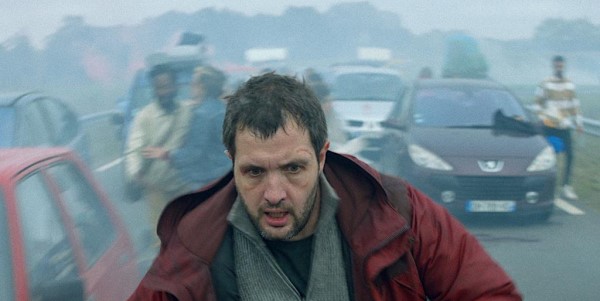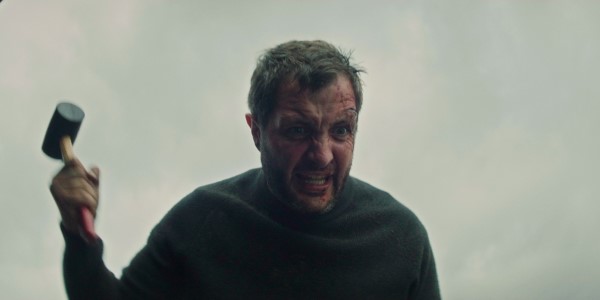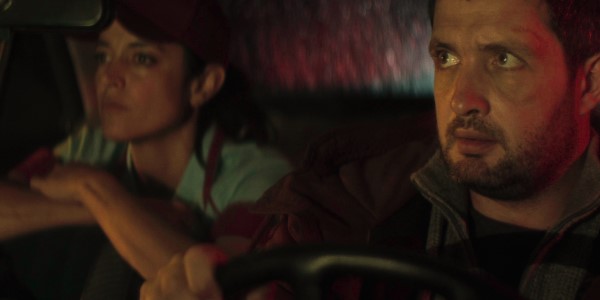Cannes Film Festival 2023: VINCENT MUST DIE

“Everyone is out to get me” is something that we often utter to ourselves or out loud when nothing seems to be going right and when the world seems to be picking a fight with only you. This train of thought has been used to great effect and in highly inventive ways throughout the years in cinema. From the paranoia thrillers of the 1970s such as The Parallax View to horrors such as Rosemary’s Baby, where you can trust no one and nowhere is safe. It has also become a physical manifestation as a narrative device in films such as Hitchc*ck’s The Birds and more recently in David Robert Mitchell’s debut It Follows where there is an ever present, relentless threat singling out the protagonist.
In Stéphan Castang‘s debut feature Vincent Must Die the concept that someone is being solely targeted by a persistent threat is used to intriguing new effect, blending a range of genres to create a curio of a film which was presented at the critics week of this year’s Cannes Film Festival.
First (Eye) Contact
The film begins in a meeting room, where graphic designer Vincent (Karim Leklou) wields his seniority to an intern with an awkward joke about getting his coffee. Later in the day as Vincent is working, he catches the eye of the intern across the office, and they stare at one another. The intern then approaches Vincent’s desk and hits him across the face with his laptop, he then has to be restrained by office staff to not strike him again. Sensing that it was a rebuke for his earlier comment, Vincent decides not to take the matter further and later that evening even uses the cut on his face to gain sympathy on his online dating profile.

However, the next day, a similar episode occurs when another employee, after making eye contact with Vincent, stabs him in the arm repeatedly with a pen but then is dumbfounded as to why he did this. Sensing a tension around Vincent, his boss suggests he works remotely but the attacks also begin outside of his workplace, from the neighbours in his buildings to random people on the street. After the initial confusion and fear, Vincent finds a pattern in the attacks, they all begin when he has eye contact with someone and stop when the eye contact is ended. From here, Vincent decides to abandon his current life and take shelter at his father’s country home away from the city while he tries to piece together a reason for the triggered violence.
The Male Gaze
Vincent is an interesting central character, not one who elicits immediate empathy from the first scene due to his insensitive actions and not one to warm to despite his predicament. Karim Leklou seems like perfect casting for Vincent, an air of entitled nonchalance exudes from early scenes but is also touched with utter confusion that is written across his face during the first attacks. And as the film progresses and Vincent’s situation worsens, Leklou’s big expressive eyes carry the weight of the world that he has to hide them from.

To begin with, it is unclear on whether his intern interaction was the catalyst for the tirade of violence towards him however as the film unfolds, Vincent discovers there are others like him. He meets a man who is able to keep his gaze without breaking into violence and who recognises that Vincent is the same as him, being attacked by those he makes eye contact with. He tells Vincent about The Sentinel website where he can connect with others like him and learn how to adapt to survive. And as news reports begin to circulate and pick up momentum about waves of violence across France, the film opens up from one man’s personal, singular fight against an external threat to a bigger metaphor about the increasing and unexplainable violence happening in our society.
All the rage
With Vincent Must Die, Stéphan Castang has fused a fascinating mix of moods, the film veers from horror to paranoid thriller, from comedy to romance, tinged with the feeling of a zombie apocalypse. There are obvious influences from the work of Hitchc*ck, with the elements of a man on the run, caught up in something bigger than he knows (such as North by Northwest) and a sudden physically violent phenomenon (akin to The Birds). Castang has said that a big influence on the film was Martin Scorcese’s After Hours, a film that deals with persecution and the abuse of the body as Vincent is repeatedly attacked in all manner of ways.
After the paranoia and fight for survival in the first act, the film develops into romantic elements as Vincent’s increased period of isolation makes him crave human connection. He meets Margaux (Vimala Pons) and a sense of two abused bodies coming together permeates the screen. It also offers the film a small glimmer of hope, that an intimate bond can be made in the bleakest of moments, despite the fact that no happy resolutions may be concluded as the film hurtles towards its end.
The humour in the film comes from the panic of the situation that Vincent faces, such as in one scene where he is testing his theory of the attacks and ends up with a coffee cup hurled at him from across his apartment building. The moments of intimacy he tries to have with Margaux provide comedic elements as they try various ways to keep her handcuffed in case, she makes fatal eye contact and turns on Vincent.

Another scene where he tries to show Margaux what happens when he has eye contact with someone goes from comedic, as the customers of a supermarket give chase to Vincent, to full-blown horror zombie attack as their car is bombarded with ferocious bodies. And as the final act shows the extent of the violence building across the country, Castang confidently brings together all the fantastical elements of the narrative together with an arresting final blow.
Conclusion
There are many reads you could take from Vincent Must Die and how its theme speaks to you will be your own experience. The fear of attack on the body, something that is inherently felt by women in society (to be on guard, to be careful what you wear and where you walk at night) but now reversed in a way upon a male protagonist. The post-pandemic world where the words ‘be kind’ have been tossed aside and it can feel increasingly like an individualistic society. Or how it’s becoming difficult to reconcile with a civilisation where random acts of violence are becoming more frequent. Whatever way you view Castang’s assured debut, the sense that we are headed towards a form of apocalypse is on the cards, it’s just whether we look it head-on or close our eyes and pretend it is not happening.
Vincent Must Die was presented at the Critics’ Week of the Cannes Film Festival 2023!
Watch Vincent Must Die
Does content like this matter to you?
Become a Member and support film journalism. Unlock access to all of Film Inquiry`s great articles. Join a community of like-minded readers who are passionate about cinema - get access to our private members Network, give back to independent filmmakers, and more.













